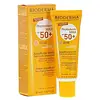What's inside
What's inside
 Key Ingredients
Key Ingredients

 Benefits
Benefits

 Concerns
Concerns

 Ingredients Side-by-side
Ingredients Side-by-side

Water
Skin ConditioningDicaprylyl Carbonate
EmollientOctocrylene
UV AbsorberMethylene Bis-Benzotriazolyl Tetramethylbutylphenol
UV FilterButyl Methoxydibenzoylmethane
UV AbsorberGlycerin
HumectantMethyl Methacrylate Crosspolymer
Cyclohexasiloxane
EmollientCyclopentasiloxane
EmollientBis-Ethylhexyloxyphenol Methoxyphenyl Triazine
Skin ConditioningGlyceryl Stearate Citrate
EmollientPotassium Cetyl Phosphate
EmulsifyingCI 77891
Cosmetic ColorantMethylpropanediol
SolventPolymethylsilsesquioxane
CI 77492
Cosmetic ColorantDecyl Glucoside
CleansingHdi/Trimethylol Hexyllactone Crosspolymer
Pentylene Glycol
Skin ConditioningMicrocrystalline Cellulose
AbsorbentC30-45 Alkyl Cetearyl Dimethicone Crosspolymer
EmollientCI 77491
Cosmetic Colorant1,2-Hexanediol
Skin ConditioningCaprylyl Glycol
EmollientDisodium EDTA
Xanthan Gum
EmulsifyingMannitol
HumectantXylitol
HumectantCI 77499
Cosmetic ColorantHydrogenated Lecithin
EmulsifyingCitric Acid
BufferingCellulose Gum
Emulsion StabilisingRhamnose
HumectantPropylene Glycol
HumectantEctoin
Skin ConditioningTocopherol
AntioxidantWater, Dicaprylyl Carbonate, Octocrylene, Methylene Bis-Benzotriazolyl Tetramethylbutylphenol, Butyl Methoxydibenzoylmethane, Glycerin, Methyl Methacrylate Crosspolymer, Cyclohexasiloxane, Cyclopentasiloxane, Bis-Ethylhexyloxyphenol Methoxyphenyl Triazine, Glyceryl Stearate Citrate, Potassium Cetyl Phosphate, CI 77891, Methylpropanediol, Polymethylsilsesquioxane, CI 77492, Decyl Glucoside, Hdi/Trimethylol Hexyllactone Crosspolymer, Pentylene Glycol, Microcrystalline Cellulose, C30-45 Alkyl Cetearyl Dimethicone Crosspolymer, CI 77491, 1,2-Hexanediol, Caprylyl Glycol, Disodium EDTA, Xanthan Gum, Mannitol, Xylitol, CI 77499, Hydrogenated Lecithin, Citric Acid, Cellulose Gum, Rhamnose, Propylene Glycol, Ectoin, Tocopherol
Titanium Dioxide 6%
Cosmetic ColorantZinc Oxide 4.7%
Cosmetic ColorantC12-15 Alkyl Benzoate
AntimicrobialButyloctyl Salicylate
Skin ConditioningNeopentyl Glycol Diethylhexanoate
EmollientParaffin
PerfumingEuphorbia Cerifera Wax
Ozokerite
Emulsion StabilisingDimethicone
EmollientBeeswax
Emulsion StabilisingPolyethylene
AbrasiveCetyl Alcohol
EmollientCeramide NP
Skin ConditioningCeramide AP
Skin ConditioningCeramide EOP
Skin ConditioningCholesterol
EmollientPhytosphingosine
Skin ConditioningSodium Hyaluronate
HumectantPolyhydroxystearic Acid
EmulsifyingAluminum Hydroxide
EmollientStearic Acid
CleansingBHT
AntioxidantCarbomer
Emulsion StabilisingTriethoxycaprylylsilane
Isostearic Acid
CleansingSodium Lauroyl Lactylate
EmulsifyingXanthan Gum
EmulsifyingTitanium Dioxide 6%, Zinc Oxide 4.7%, C12-15 Alkyl Benzoate, Butyloctyl Salicylate, Neopentyl Glycol Diethylhexanoate, Paraffin, Euphorbia Cerifera Wax, Ozokerite, Dimethicone, Beeswax, Polyethylene, Cetyl Alcohol, Ceramide NP, Ceramide AP, Ceramide EOP, Cholesterol, Phytosphingosine, Sodium Hyaluronate, Polyhydroxystearic Acid, Aluminum Hydroxide, Stearic Acid, BHT, Carbomer, Triethoxycaprylylsilane, Isostearic Acid, Sodium Lauroyl Lactylate, Xanthan Gum
Ingredients Explained
These ingredients are found in both products.
Ingredients higher up in an ingredient list are typically present in a larger amount.
Xanthan gum is used as a stabilizer and thickener within cosmetic products. It helps give products a sticky, thick feeling - preventing them from being too runny.
On the technical side of things, xanthan gum is a polysaccharide - a combination consisting of multiple sugar molecules bonded together.
Xanthan gum is a pretty common and great ingredient. It is a natural, non-toxic, non-irritating ingredient that is also commonly used in food products.
Learn more about Xanthan Gum